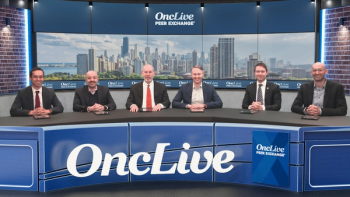
Panelists discuss future perspectives on the role of menin inhibitors in the treatment of acute lymphoblastic leukemia (AML), exploring potential advancements and clinical implications.

Your AI-Trained Oncology Knowledge Connection!


Panelists discuss future perspectives on the role of menin inhibitors in the treatment of acute lymphoblastic leukemia (AML), exploring potential advancements and clinical implications.

Panelists discuss preclinical findings on the potential role of menin inhibitors in relapsed/refractory T-cell acute lymphoblastic leukemia (R/R T-ALL), the implications of p-MEF2C as a biomarker for reshaping the therapeutic landscape and integrating menin inhibitors such as revumenib into clinical practice, and what they anticipate learning from the upcoming presentation on menin inhibitor resistance, highlighting the role of MEN1 mutations in guiding treatment sequencing for MI-resistant acute leukemias.

Panelists discuss the interim phase 1a results from KOMET-007 in newly diagnosed NPM1-mutated or KMT2A-rearranged AML, the potential role of ziftomenib combined with 7 plus 3 chemotherapy in standard induction therapy for high-risk acute monocytic leukemia (AML) patients with these mutations, preclinical findings on the combination of ziftomenib and selinexor in NPM1-mutant AML, and the mechanistic synergy between these therapies, exploring their potential in clinical practice and across other AML subtypes.

Panelists discuss the importance of genetic testing, particularly for KMT2A and NPM1 mutations, in identifying patients who would benefit from revumenib, the role of molecular profiling in identifying high-risk acute monocytic leukemia (AML) patients, approaches to KMT2A testing, and when to recommend RNA over DNA testing, along with guidance for institutions lacking standardized diagnostic testing protocols.

Panelists discuss key findings from the phase I/II study of the all-oral SAVE combination with revumenib in relapsed/refractory acute monocytic leukemia (R/R AML), the impact of the regimen's success in achieving high response and MRD negativity rates on integrating all-oral therapies into the treatment paradigm for R/R AML, particularly in patients with prior venetoclax or transplant exposure, and the potential role of revumenib in current treatment paradigms for R/R AML.

Panelists discuss the role of minimal residual disease (MRD) testing in acute monocytic leukemia (AML), key findings from the Australasian Leukaemia and Lymphoma Group (ALLG) AMLM26 INTERCEPT study on revumenib, and how the efficacy of revumenib in achieving MRD negativity in NPM1-mutated AML informs future MRD-guided treatment strategies, including the potential integration of menin inhibitors into standard AML relapse prevention protocols.

Panelists discuss the most commonly seen adverse effects (AEs) in menin inhibitor treatment, strategies for managing and mitigating these AEs to optimize outcomes, and how they compare across approved and pipeline menin inhibitors, along with best practices for clinicians to manage differentiation syndrome, a critical safety concern.

Panelists discuss the data updates from the AUGMENT-101 trial, the potential of revumenib to reshape the treatment landscape for patients with heavily pretreated KMT2A-rearranged acute leukemia, including its observed objective response rate (ORR) and complete remission (CR)/ CR with partial recovery of peripheral blood counts (CRh) rate, and the clinical implications of revumenib in the context of bridging to stem cell transplantation.

Panelists discuss the FDA approval of revumenib for relapsed/refractory acute leukemia (R/R AML) with KMT2A translocation, reviewing the eligible patient population and the mechanism of action of this menin inhibitor, while exploring key findings from the AUGMENT-101 trial and how this approval may impact treatment approaches in both the R/R and broader AML settings.

Panelists discuss how treatment goals in the second- and third-line settings for relapsed/refractory acute monocytic leukemia (R/R AML) now focus more on disease control, quality of life, and prolonging survival, and explore the most significant unmet needs in R/R AML, particularly in addressing drug resistance and optimizing therapeutic strategies.

Panelists discuss how achieving responses with second-line treatment options after venetoclax-based regimens remains challenging, and explore strategies for bridging therapy to allogeneic hematopoietic stem cell transplantation (allo-HSCT) in patients who relapse post venetoclax while also addressing the evolving management of patients following transplant.

Panelists discuss how the latest NCCN guidelines for relapsed/refractory acute monocytic leukemia (R/R AML) outline targeted therapy options outside clinical trials, and explore treatment approaches based on patient fitness, actionable biomarkers, and prior therapies, highlighting the impact of first remission duration and genetic abnormalities on treatment sequencing.